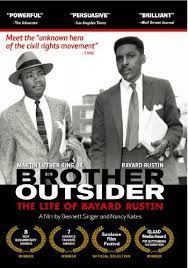
BROTHER OUTSIDER: THE LIFE OF BAYARD RUSTIN
US, 2023, 83 minutes, Colour.
Directed by Nancy D.Kates, Bennett Singer.
Bayard Rustin was a significant figure in the US, the 20th-century figure, campaigner for Civil Rights, a master organiser. However, in more recent times, he has seemed to have faded from the American memory. His life, 1912-1987.
With the making of the film, Rustin, and actor Colman Domingo playing him, receiving an Oscar nomination, and the film streaming on Netflix (as does this documentary) brought him to more prominence.
While Rustin presented an overview of his life and career, there was a particular emphasis on his role in the organisation of the 1963 March on Washington. In fact, there is more detail of the organisation and its dramatic effect in the film than in this documentary. It is certainly present, the visuals, his presence, Odetta and Mahalia Jackson singing, the presence of Martin Luther King, and his iconic speech. But, Rustin stands back, behind Martin Luther King. This documentary praises the role of Rustin in the organising of the March and mentions that King’s speech is the icing on the cake.
We are presented here with an extensive biography of Rustin, but with the great advantage of having much footage of him, the civil rights movements prior to 1960, his campaigning in 1959 against French nuclear tests, his being influenced by such leaders as A.J.Aste and A..Paul Randolph, and a great deal of footage with each of these men. The other advantage is so much footage of Rustin himself, his speeches, ranging from the 1940s to the 1980s. And, especially, noted as a singer, a number of excerpts of his singing, especially from protest songs and Negro spirituais. The cumulative effect is a portrait of Rustin and his American times.
Rustin was a gay man, confident in his orientation, A.J.Aste having some preoccupations about this. But, 1953 saw a significant event in Rustin’s life which had some damning consequences on his career and reputation. He was arrested in Pasadena, California, Inezsociation with homosexual cruising. This caused a difficulty for Martin Luther King – but also an opportunity for politicians who attack King, indicating that he had sexual relationship with Rustin. This critique of Rustin had great influence in the 1950s, even in the African-American community.
However, Rustin was urged to come back to the US from Africa (protesting France’s nuclear tests) for the March on Washington at the time of the 1960 presidential election. Working with Martin Luther King, King then becoming wary, eventually reconciliation, Rustin entrusted with the organisation of the 1963 March.
While this documentary does give some attention to his work, there is, as mentioned, more in the film about him. However, it is a climactic event in this documentary, Rustin wondering whether the crowds would come, their eventual arrival, the impressive visuals of the gathering, the singing, the speeches.
The latter part of the film is interesting in contrasting Rustin’s perspective on progress with that of such activists as Malcolm X, Hughie Newton. Scenes of debate with Malcolm X and his wanting the African community to be separate from whites, Rustin advocating the difference between protest, which can be full on, and politics which inevitably requires compromise. He insisted that African-Americans be part of the political process. This was dramatised in the opposition to the Vietnam war, Rustin rather reticent of criticism, relying initially on Lyndon Johnson and his sympathetic promotion of civil rights. Comments are made that he was on Nixon’s list of enemies – and he gives a vigorous speech happy to be on the list and condemning Nixon.
In the latter part of his life, his active cause was for gay and lesbian rights, protests, campaigning.
Throughout the film there are interviews with people commenting on his sexual orientation, some of his friendships, the testimony of one of his lovers and the breaking of the relationship, the young man in the latter part of his life giving testimony for him.
Throughout the film there is a great deal of commentary from talking heads, insights into the attitudes of the times, commentators, African-American political leaders, Rustin’s nephew.
This documentary is certainly very informative, creating a lively portrait of Rustin – but, to see his life and causes played out dramatically, it is worth watching the feature film.